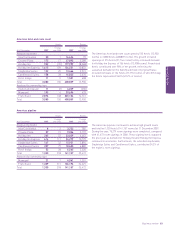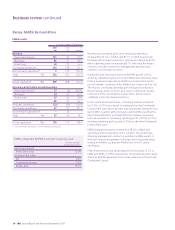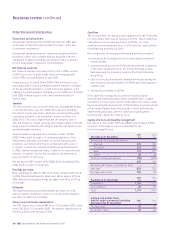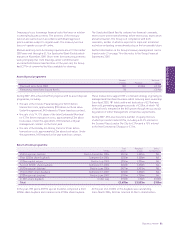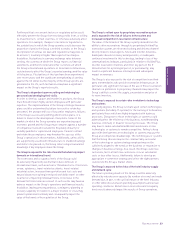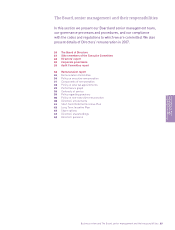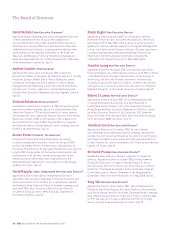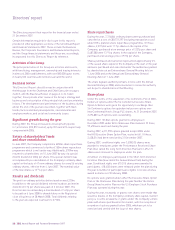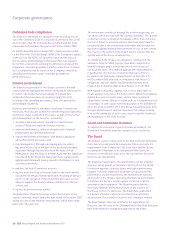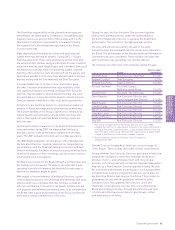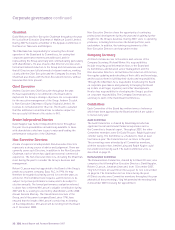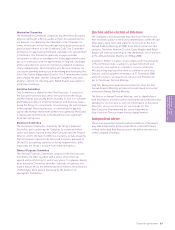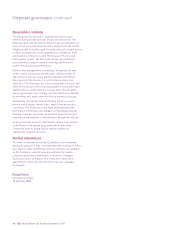Holiday Inn 2007 Annual Report Download - page 26
Download and view the complete annual report
Please find page 26 of the 2007 Holiday Inn annual report below. You can navigate through the pages in the report by either clicking on the pages listed below, or by using the keyword search tool below to find specific information within the annual report.24 IHG Annual Report and Financial Statements 2007
Business review continued
The Group may experience a lack of selected development
opportunities
While the strategy of the Group is to extend the hotel network
through activities that do not involve significant capital, in some
cases the Group may consider it appropriate to acquire new land
or locations for the development of new hotels. If the availability
of suitable sites becomes limited, this could adversely affect its
results of operations.
The Group is exposed to risks related to corporate responsibility
The reputation of the Group and the value of its brands are
influenced by a wide variety of factors, including the perception
of key stakeholders and the communities in which the Group
operates. The social and environmental impacts of business are
under increasing scrutiny, and the Group is exposed to the risk
of damage to its reputation if it fails to demonstrate sufficiently
responsible practices in a number of areas such as sustainability,
responsible tourism, environmental management, human rights
and support for the local community.
The Group is exposed to the risk of litigation
The Group could be at risk of litigation from its guests, customers,
joint venture partners, suppliers, employees, regulatory authorities,
franchisees and/or the owners of hotels managed by it for breach
of its contractual or other duties. Claims filed in the US may
include requests for punitive damages as well as compensatory
damages. Exposure to litigation or fines imposed by regulatory
authorities may affect the reputation of the Group even though
the monetary consequences are not significant.
The Group may face difficulties insuring its business
Historically, the Group has maintained insurance at levels
determined by it to be appropriate in light of the cost of cover
and the risk profiles of the business in which it operates. However,
forces beyond the Group’s control including market forces, may
limit the scope of coverage the Group can obtain as well as the
Group’s ability to obtain coverage at reasonable rates. Other
forces beyond the Group’s control, such as terrorist attacks or
natural disasters may be uninsurable or simply too expensive
to insure against. Inadequate or insufficient insurance could
expose the Group to large claims or could result in the loss of
capital invested in properties, as well as the anticipated future
revenue from properties, and could leave the Group responsible
for guarantees, debt or other financial obligations related to
such properties.
The Group is exposed to a variety of risks associated with its ability
to borrow and satisfy debt covenants
The Group is reliant on having access to borrowing facilities
to meet its expected capital requirements and to maintain an
efficient balance sheet. The majority of the Group’s borrowing
facilities are only available if the financial covenants in the
facilities are complied with. If the Group is not in compliance
with the covenants, the lenders may demand the repayment of
the funds advanced. If the Group’s financial performance does
not meet market expectations it may not be able to refinance its
existing facilities on terms it considers favourable. The availability
of funds for future financing is, in part, dependent on conditions
and liquidity in the capital markets.
The Group is required to comply with data privacy regulations
Existing and emerging data privacy regulations limit the extent
to which the Group can use customer information for marketing
or promotional purposes. Compliance with these regulations
in each jurisdiction in which the Group operates may require
changes in marketing strategies and associated processes which
could increase operating costs or reduce the success with which
products and services can be marketed to existing or future
customers. In addition, non-compliance with privacy regulations
may result in fines, damage to reputation or restrictions on the
use or transfer of information.
The Group is exposed to funding risks in relation to the defined
benefits under its pension plans
The Group is required by law to maintain a minimum funding
level in relation to its ongoing obligation to provide current and
future pensions for members of its pension plans who are entitled
to defined benefits. In addition, if any plan of the Group is wound
up, the Group could become statutorily liable to make an
immediate payment to the trustees to bring the funding of these
defined benefits to a level which is higher than this minimum.
The contributions payable by the Group must be set with a view
to making prudent provision for the benefits accruing under the
plans of the Group.
Some of the issues which could adversely affect the funding of
these defined benefits (and materially affect the Group’s funding
obligations) include:
• poor investment performance of pension fund investments
which are substantially weighted towards global equity
markets;
• long life expectancy (which will make pensions payable
for longer and therefore more expensive to provide);
• adverse annuity rates (which tend in particular to depend
on prevailing interest rates and life expectancy) as these will
make it more expensive to secure pensions with an insurance
company; and
• other events occurring which make past service benefits more
expensive than predicted in the actuarial assumptions by
reference to which the Group’s past contributions were assessed.
The trustees of the UK defined benefit plan can demand increases
to the contribution rates relating to the funding of this pension
plan, which would oblige the relevant members of the Group to
contribute extra amounts to such pension funds. The trustees
must consult the plan’s actuary and principal employer before
exercising this power. In practice, contribution rates are agreed
between the Group and the trustees on actuarial advice, and are
set for three year terms. The last such review was as at
31 March 2006.



